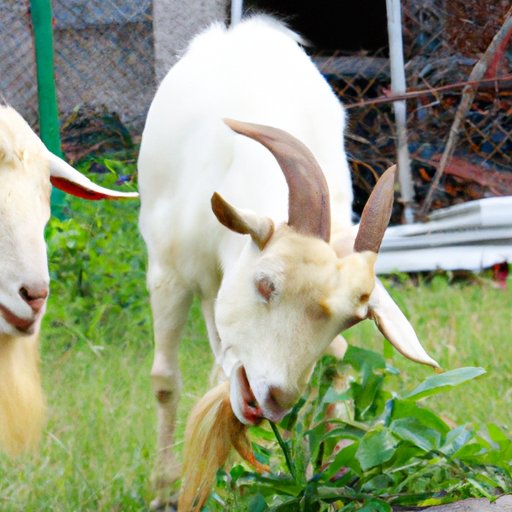Introduction
Goats are well-known for their hearty appetite and willingness to try new things, but this can be a double-edged sword when it comes to their nutrition. Goats need a balanced diet in order to stay healthy, and there are certain foods and plants that they should never eat. This article will explore what can’t goats eat, as well as the potential dangers of feeding them unsafe foods and plants.
Exploring the Do’s and Don’ts of Goat Nutrition
Goats need a balanced diet of proteins, vitamins, minerals, and fiber in order to stay healthy. They also need access to fresh water and plenty of exercise. When creating a diet for your goats, it is important to make sure that you are providing them with all of the nutrients they need while avoiding any potentially harmful ingredients.
When it comes to proteins, goats need a variety of sources, such as grains, hay, and legumes. For vitamins and minerals, goats need calcium, phosphorus, and vitamin A. Finally, for fiber, goats need roughage such as hay or grass. It is important to note that goats require more protein than other animals, so it is important to make sure that their diet includes enough of this nutrient.
In addition to knowing what to feed goats, it is also important to know what not to feed them. Certain ingredients, such as chocolate, caffeine, and alcohol, can be toxic to goats and should be avoided. Additionally, some plants, such as azaleas and oleanders, can be poisonous if ingested by goats.
Common Human Foods that are Toxic to Goats
There are many common human foods that are toxic to goats and should be avoided at all costs. Chocolate, coffee, and tea should never be given to goats, as these contain caffeine, which can be toxic in large quantities. Alcohol should also be avoided, as it can cause dehydration and an upset stomach. In addition, onions and garlic can be toxic to goats and should be kept out of their reach.
It is also important to avoid giving goats any processed foods, such as chips or candy. These items are high in fat and sugar, which can lead to obesity and other health problems. Additionally, canned foods should never be given to goats, as they can contain preservatives and other additives that can be dangerous.

What Not to Feed a Goat: A Comprehensive List
In addition to the foods listed above, there are many other items that should be avoided when feeding goats. Avocados, for example, contain a toxin called persin that can be fatal if ingested by goats. Rhubarb leaves are also toxic, as they contain oxalic acid, which can be damaging to a goat’s kidneys. Other plants to avoid include daffodils, yews, and tulips, as these can cause gastrointestinal distress if eaten.
In addition, it is important to avoid giving goats any moldy or spoiled food, as this can cause food poisoning. Additionally, dairy products, such as milk and cheese, should be avoided, as goats do not have the necessary enzymes to break down lactose. Finally, it is important to keep all medications, such as aspirin and ibuprofen, away from goats, as they can be toxic if ingested.
The Dangers of Feeding Goats Unsafe Foods
Feeding goats unsafe foods can have serious consequences. Ingesting toxic plants or foods can cause vomiting, diarrhea, and even death in some cases. Additionally, consuming moldy or spoiled food can lead to food poisoning, which can be deadly if left untreated. Finally, feeding goats too much sugar or fat can lead to obesity and other health problems.

Goats and Poisonous Plants: What You Need to Know
In addition to avoiding certain foods, it is also important to be aware of which plants are toxic to goats. Azaleas, oleanders, and rhododendrons are all poisonous to goats and should be kept out of their reach. Additionally, yew plants can cause heart failure if ingested, and daffodils can cause seizures and respiratory issues. It is important to be aware of what plants are in your area and to make sure that your goats don’t have access to them.

Creating a Healthy Diet for Your Goats
Creating a healthy diet for your goats is essential for their health and wellbeing. The best way to do this is to provide them with a variety of proteins, vitamins, minerals, and fiber. Grains, hay, and legumes are all good sources of protein, while calcium, phosphorus, and vitamin A can be found in leafy greens and other vegetables. Finally, hay and grass are great sources of fiber.
In addition to providing a balanced diet, it is important to make sure that your goats have access to clean, fresh water at all times. It is also important to provide them with plenty of exercise, as this will help keep them healthy and active. Finally, it is important to make sure that your goats are not exposed to any toxic foods or plants, as this can be dangerous for their health.
Conclusion
Goats are known for their hearty appetites, but it is important to know which foods and plants are toxic to them. This article has explored what can’t goats eat and why it is important to avoid feeding them unsafe foods and plants. By providing your goats with a balanced diet, plenty of exercise, and access to clean, fresh water, you can ensure that they stay happy and healthy.
(Note: Is this article not meeting your expectations? Do you have knowledge or insights to share? Unlock new opportunities and expand your reach by joining our authors team. Click Registration to join us and share your expertise with our readers.)
